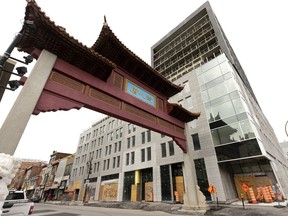Also OKs plan to give several buildings heritage status

Chinatown will not be the site of any more skyscrapers and its historic buildings will be preserved, according to a new plan adopted by Montreal’s executive committee.
The committee enacted a change to the city’s urban plan Wednesday that will limit the height of buildings in the neighbourhood to 25 metres (about eight storeys).
Sign up to receive daily headline news from the Montreal Gazette, a division of Postmedia Network Inc.
Thanks for signing up!
A welcome email is on its way. If you don't see it, please check your junk folder.
The next issue of Montreal Gazette Headline News will soon be in your inbox.
“We wanted to act quickly, because the community asked us to,” said Robert Beaudry, the executive committee member in charge of urban planning. “It’s a great day for Montreal’s Chinatown.”
In addition to the height limits, several buildings will be given heritage status, including the former Free Presbyterian Church at 991 Côté St. as well as the Canadian Cork Cutting Company at 1030 Chenneville St. It also enlarges the area that is designated as Chinatown: to the area bounded by Bleury and St-Urbain Sts., Viger Ave. and René-Lévesque Blvd.
The approval comes after hearings held this year by the Office de consultation publique de Montréal and its report, published in October. The borough of Ville Marie approved the limits at its most recent council meeting, and the change will now have to be ratified in a vote by the city council later this month.
Chinatown is also in the process of being designated a heritage site by the province, a process that was announced this year but can take several years to come into effect. As part of that announcement, the 1826 British and Canadian School at 1009 Côté St., now the site of the factory Wing’s Noodles, was protected.
Chinatown is the oldest urban area outside the original walls of the city. Known as Près-de-ville in the 18th century, when it was just outside the gates of the walled city, it became home to successive waves of immigrants.
Yet unlike Old Montreal, whose buildings are well documented and protected from demolition and alteration, Chinatown’s architectural heritage has received scant attention. That was until activists recently sounded the alarm over the potential for historic landmarks to be razed when developers of high-end condominiums purchased several blocks of the neighbourhood.
According to historical sources consulted by the Montreal Gazette, the neighbourhood was a unique example of vivre-ensemble over more than two centuries. They tell of fur traders and Patriotes; business magnates and sweatshop workers; dour Scottish Presbyterians and Yiddish-speaking Jews; lonesome laundrymen and successful restaurateurs.
The area has been home to the city’s Chinese community since the late-19th century.
More on the history of Chinatown, including may of its notable buildings, can be seen in this report from 2021.
jmagder@postmedia.com
twitter.com/jasonmagder
-

Can Montreal's Chinatown survive?
-

Zoning changes for Montreal's Chinatown to be discussed at public hearings in June


